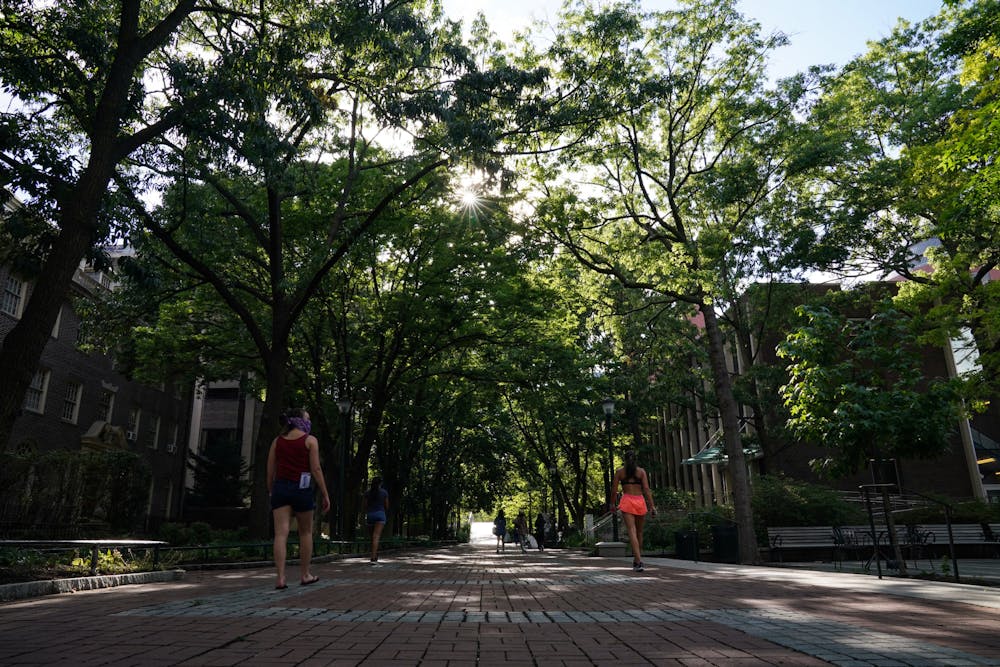The Palestine Writes controversy has sparked diverging responses among local and national Jewish communities.
In the past week, at least two groups of Jewish Penn community members sent letters to administrators condemning their response to the controversy surrounding the Palestine Writes Literature Festival. The disparate responses — combined with the impact of external Jewish activist groups across the country — represent only some of the Jewish communities who have weighed in on the controversy.
One letter signed by almost 200 members of Philadelphia’s Jewish community, 69 of whom are Penn-affiliated, was sent to Penn President Liz Magill, Provost John Jackson Jr., and School of Arts and Sciences Dean Steven Fluharty on Sept. 20. The letter calls for administration to “emphasize that Palestinian activism has no inherent relation with antisemitism” and “protect the safety of Festival attendees.”
“By using this celebration of Palestinian literary traditions as an occasion to condemn antisemitism, your statement further marginalizes Palestinian experiences on campus, while supporting attempts to conflate Palestinian liberation with antisemitism,” the letter says.
Ph.D. student Hilah Kohen drafted the letter after holding conversations with different Jewish circles at Penn. They said they expressed frustration with “how deeply institutions like Penn tend to marginalize Palestinian members of the community.”
Key groups involved with the letter include Penn Chavurah, a student-run group for progressive Jews and Jewish Voices for Peace Philadelphia, a group that aims to build a “strong, resilient Jewish community beyond Zionism.”
College senior Jack Starobin, who is involved with Chavurah and signed the letter, expressed frustration with the administration’s failure to condemn specific speakers, asserting that their generalizations “paint the festival in one brushstroke.” He said that he hopes the administration will clarify its support for Palestinian students and their rights to the festival.
“There are 120 speakers at the festival who are worthy of programming and cultural self-exploration,” Starobin said. “I hope that the letter shows that there are many Jews who are in support of the Palestinian right to have that space.”
RELATED:
Multiple Penn trustees sign letter to Magill demanding stronger response to Palestine Writes uproar
Dozens of faculty express 'deep concern' with Penn response to Palestine Writes festival
College senior Eyal Yakoby sent another letter signed by over 200 anonymous Penn community members — including undergraduate students — to Magill, Jackson, and Fluharty on Sept. 18. The letter was also sent to the directors of the Penn organizations and departments that sponsored the event. The letter condemned the antisemitism of seven speakers at the festival, asserting that their presence leads to a “hostile” experience for Jewish students, "regardless of their course of study.”
Yakoby said that he hopes the letter will help decision makers see that the majority of Penn students do not condone the speakers attending the festival.
In the letter, he claimed that several Penn community standards have been violated by the University hosting the festival, including the right to be free from discrimination, the right for students to participate in University organizations without fear or threat, and condemnation of hate speech and racial, ethnic, and religious slurs.
The letter was circulated in several Greek life group chats, which Yakoby said was the best way to reach a majority of students. He added that the signers were anonymous out of fear of retaliation stemming from the recent faculty letter in support of the festival.
Yakoby stated that the only Penn organization he received a response from was the Middle East Center Director Harun Küçük.
Beyond local groups of students, many Penn community members have noted the impact of national groups on the discourse surrounding the Palestine Writes Literature Festival.
Since the festival has escalated into a campus-wide controversy, external pro-Israel activists have descended on campus, parking jumbotron trucks, distributing iced teas, and advertising on TikTok with the same message: pointing out some of the speaker's past antisemitic remarks. Several jumbotron trucks displayed Magill's face next to festival organizers and speakers and a QR code that directs to a petition opposing the festival.
The TikToks and jumbotron trucks have been funded by groups such as the Anti-Defamation League and the Jewish Leadership Project. Ralph Avi Goldwasser, an employee at JLP, said that the group had funded one truck at Penn and one at Princeton University, which is facing its own controversy surrounding an assigned book in a Near Eastern studies course.
Two employees managing a truck on campus interviewed by The Daily Pennsylvanian, who identified themselves as Jose and Rich, declined to provide the name of the advertising company funding the truck, which was located near the Annenberg School for Communication on Walnut Street Tuesday. This truck had a QR code directed to a petition by "Alums for Campus Fairness."
Starobin said that much of the coverage of the event he has seen has used "racist talking points" that have been used on campus to "discredit the festival."
“The controversy has drawn attention to Jewish communal spaces, and clearly some of that attention has been hostile,” Starobin said. “Agents of hate will take the license that they can to act, and that’s a scary thing.”









